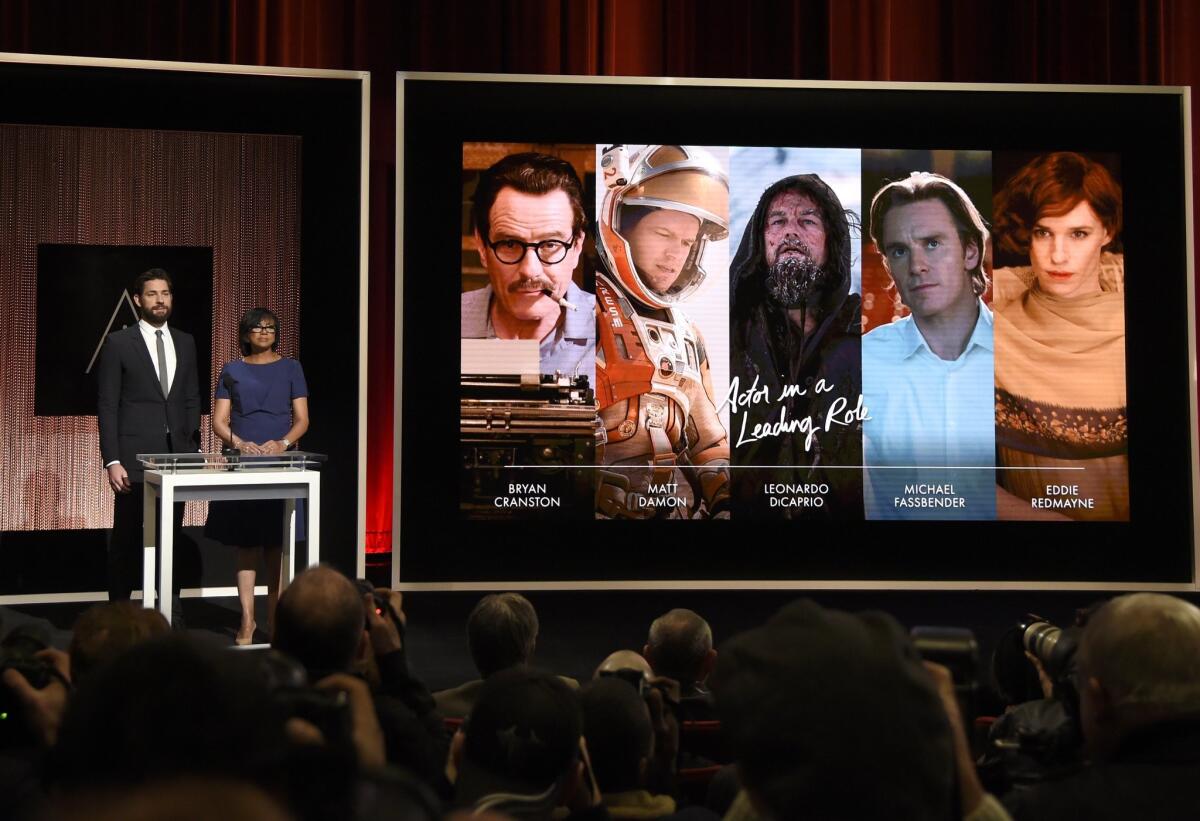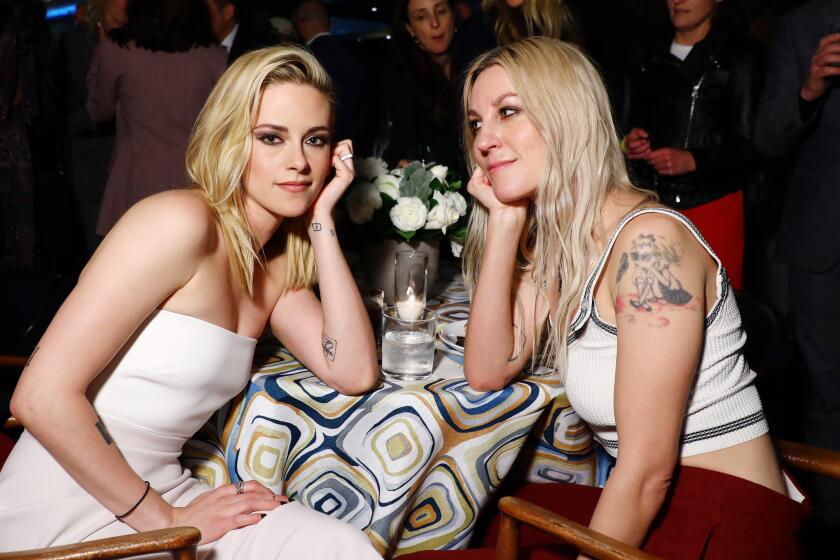Academy voters, in their own words, weigh in on the #OscarsSoWhite backlash

Actor John Krasinski and Academy of Motion Picture Arts and Sciences President Cheryl Boone Isaacs announce the 2016 Oscar nominations Jan. 14.
- Share via
In the wake of the Jan. 14 announcement of this year’s Oscar nominations – which, for the second year in a row, included no actors of color – the Academy of Motion Picture Arts and Sciences quickly became swept up in a controversy as intense as any it has faced in its nearly 90-year history.
Amid allegations of systemic racial bias and calls from some like director Spike Lee and actress Jada Pinkett Smith for a boycott of this year’s telecast, the academy moved quickly last week to enact sweeping new membership rules aimed at doubling the number of women and minorities in its ranks by 2020. As part of the changes, some older members who are no longer actively working in the business may lose their voting privileges.
The Times reached out to scores of the 1,138 members of the academy’s actors branch – the largest by far and the one responsible for selecting the acting nominees – to try to get a sense of how the rank-and-file (which, according to a 2012 Times analysis, is predominantly older and white) sees the #OscarsSoWhite backlash and what it has felt like to be in the eye of this storm.
Many argue any allegations of racial bias are misplaced. Others say the academy’s demographics do inevitably skew the nominations in some ways. Some welcome the debate and the changes it has spurred, while others are clearly angered by them.
Join the conversation on Facebook >>
Following on the story The Times ran Sunday, here are some more perspectives from inside the academy’s actors branch. (Some interviewees asked to remain anonymous due to the sensitivity of the subject matter.)
Maud Adams, 70, best known as a “Bond girl” in the films “The Man With the Golden Gun” and “Octopussy”:
“Yes, it is unfortunate that some very worthy acting performances do not get nominated, but it has always been so. The nominations are not an exact science and I do not believe that race was a factor. With only a few slots to fill and an abundance of great performances, especially this year, the acting nominations however, can become somewhat of a lottery. Today’s academy, although largely white, consist of some of the most liberal-minded and tolerant members of any group, as shown in recent years’ nominations and Oscar winners.”
Jennifer Warren, 74, whose credits include the films “Night Moves” and “Slap Shot” and who now heads the directing track at the USC School of Cinematic Arts:
“I voted for ‘Straight Outta Compton’ for best film, at the top of the list. And I happen to think ‘Creed,’ the director [Ryan Coogler] and the leading man [Michael B. Jordan] should have been nominated. It got all those reviews but I don’t think people saw it. It’s ‘too black.’
“I don’t think [Oscar voters] are prejudiced – I just think they’re slow and they don’t have enough time to see all the films, and the ones that are going to get left behind are the ones that are not the most ‘like them.’
“When you see the reviews for ‘Creed’ and ‘Compton,’ they are so much more ecstatic than most other films that have come out that it’s not about the quality of those films. It’s about the fact that people didn’t see them before they voted. And there are all those white people out there.”
An actor in his 40s, still actively working:
“It’s an unfortunate situation. But it’s not the academy – it’s the industry. The academy can only sort through what they’re given and the industry isn’t giving them much. Studios need to do better. The culture has to change before the Oscars can change.”
David Huddleston, 85, best known for playing the title role in “The Big Lebowski”:
“I think [the backlash] is unfortunate and a bit unwarranted. I feel choices were made based on roles and performances. Many times, regardless of color, good performances are not included due to numbers. Not everyone who delivers a wonderful performance can secure an Oscar nomination in a given year.
“If more choice roles are available to women or men or people of color or seniors or young people, more nominations will be reflected in nominations worthy of the academy. The focus should be put on developing better scripts and training better actors, not complaining after the fact, even if a given film was a blockbuster or promoted with lots of publicity.”
Robert Walden, 72, best known for his work on the TV series “Lou Grant”:
“I’m a New Yorker, raised on the Lower East Side of Manhattan. So I grew up in what I’d consider the United Nations, there were so many different nationalities and races. But I don’t believe that’s true for so many academy members. Especially the older ones.
“Many of them view the films at home, with their mates and children. I’m guessing but my intuition tells me that ‘Straight Outta Compton’ and ‘Beasts of No Nation’ and ‘Chi-Raq’ might not feel ‘comfortable’ for them to share with family members. That’s my guess. Because there were several excellent performances by actors of color that did not make the cut. And it bothered me.”
An actress in her 60s, still actively working primarily in television:
“Race wasn’t a factor in my voting. The whole thing just stinks. It’s bad for everyone, but really unfortunate for the movies and artists nominated this year. It completely overshadows the ability to honor their work. I feel terrible for them.”
Carole Wells, 73, who worked primarily in television in the ‘60s and ‘70s:
“I do think a lot of the older members really watch most of the films, as I do. I watch them more than once if I like someone in it or [the screenwriter] and again after the nominations come out. But I do also think most of the old guys are too set in their ’50s mentalities to even want to watch ‘Straight Outta Compton’ or ‘Room’ because of the subject matter.
“Also my generation is appalled by the comedians who are such potty mouths. We remember Bob Hope, Jack Benny, Johnny Carson and Steve Allen, who never used rank humor. Amy Schumer wouldn’t even get a watch.”
Jerry Hardin, 86, known from films like “The Firm” and as Deep Throat on TV’s “The X-Files”:
“Race had nothing to do with any of my votes. The academy’s Oscar is an effort to honor and recognize excellence in film and storytelling. Race and political correctness has no place in the process, nor should it have.
“Whatever anybody else thinks, I believe the academy should continue to recognize those who bring excellence and unusual talent to film and the vote falls where it falls. The industry is filled with talented people who are not recognized with Oscars and the notion that the vote for excellence must be filtered through race and gender to be valid is absurd.”
Asa Maynor, 79, who worked in film and television from the ‘50s to the ‘70s:
“I loved ‘Straight Outta Compton.’ I thought it was terrific, but I guess not enough people did... I wouldn’t necessarily be out to change the academy. If people want to make a difference, they should talk to the studios.”
An actress in her 70s, still actively working:
“I think it is an outcry that doesn’t take demographics into consideration. Are we to have a quota system now? I don’t think it can be prevented nor should changes be made. Some movies don’t appeal to a lot of people. Some actors don’t appeal to a lot of people. Some nominations for people of color in the past have not been worthy, in my consideration.
“I judge on the acting alone — many of my nominations are not in sync with the body of voters, who seem to go on who’s famous or already a star rather on the actual work itself. Different stories appeal to different people. It will always be the case.”
Ron Masak, 79, best known for his role as a sheriff on “Murder, She Wrote”:
“The fact that [the rule changes] came so quickly, to me, makes me feel like we’ve been bullied. Let the fire go out and let the smoke settle. The fact that it happened so fast feels like intimidation set in.... You’re telling [older members] now their opinion doesn’t count, that they can’t judge talent. That’s silly.”
An Emmy-winning, Golden Globe-nominated actor in his 50s:
“Movies that have to do with ethnic and racial subject matter, many times when it’s been something more nuanced and of-the-moment, it’s been overlooked. You only have to go back to ‘Driving Miss Daisy’ versus ‘Do the Right Thing.’ What film had a bigger effect on people? There’s no comparison.
“I thought ‘Straight Outta Compton’ was a terrific film but you’ve got to be interested. You have to be curious about other cultures and other races. People will sometimes shy away from certain things. So many times we see things that are soft, that are reassuring and have kind of this cachet [get nominated]. There are a lot of great actors from England but I feel like there is almost this inferiority complex that you have here. I feel like sometimes people would rather vote for ‘Masterpiece Theater’ than ‘Straight Outta Compton.’
“This is bigger than the Academy Awards – way bigger. You see it in everything. You can see it in the language of the politicians on the stump. You see it in the police issues. You see it in what’s happening in Flint, Mich. People are polarized. This is part of society. What’s happening with the academy is a reflection of it.”
Times staff writers Marisa Gerber, Mark Olsen and Glenn Whipp contributed to this report.
ALSO
‘SNL’ parodies #OscarsSoWhite in ‘Screen Guild Awards’ sketch
Here’s what Academy voters have to say about the #OscarsSoWhite backlash
‘I’m going to the Knicks game’: Spike Lee applauds Oscars rule changes but still won’t attend
More to Read
Only good movies
Get the Indie Focus newsletter, Mark Olsen's weekly guide to the world of cinema.
You may occasionally receive promotional content from the Los Angeles Times.











